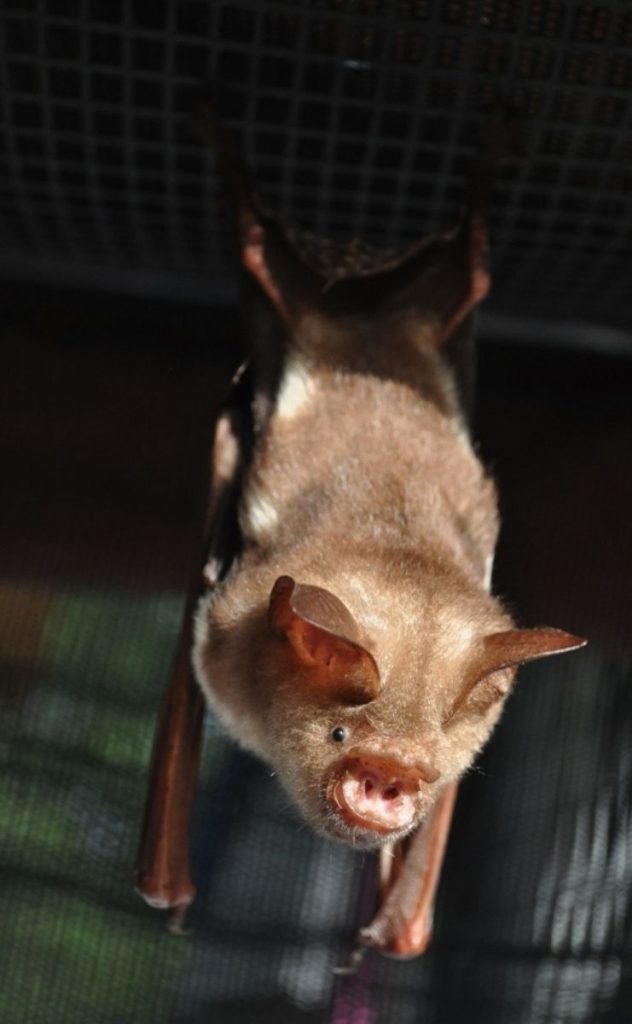Critter Corner – Diadem Leaf-nosed Bat
#CritterCorner – Deep within the rainforests of north-eastern Queensland lives one of Australia’s most striking bats: the Diadem Leaf-nosed Bat (Hipposideros diadema reginae).
– Deep within the rainforests of north-eastern Queensland lives one of Australia’s most striking bats: the Diadem Leaf-nosed Bat (Hipposideros diadema reginae).
This subspecies of the widespread Hipposideros diadema is found only in Queensland, from Cape York to Townsville and west to Chillagoe. With its regal nose-leaf, powerful bite, and unique hunting style, it plays a vital role in the rainforest ecosystem.
A Bat Fit for Royalty
The Diadem Leaf-nosed Bat is named for the crown-like folds of skin on its nose. Far from ornamental, these structures focus its constant-frequency echolocation calls, helping it detect and capture prey in the dark.
Weighing 32–57 grams with a wingspan up to 40 cm, it is the largest Hipposideros in Australia. Its fur ranges from pale grey-brown with buffy shoulder spots to brilliant orange in some colonies.
A Master Hunter of the Night
These bats are formidable insect-eaters, specialising in hard-shelled beetles that many other bats cannot crack. Their strong jaws and large teeth allow them to crunch through scarab and click beetles with ease.
Unlike bats that chase prey continuously on the wing, the Diadem Leaf-nosed Bat often uses “perch hunting.” From a tree branch, culvert or cave entrance, it hangs quietly, listening and echolocating until an insect passes by. Then, in a burst of speed, it swoops out to snatch its meal, sometimes storing extra insects in cheek pouches to eat later.
Keeping the Rainforest in Balance
Just as cassowaries are known as “rainforest gardeners” for dispersing seeds, bats like the Diadem Leaf-nosed Bat are essential “rainforest pest controllers.” By keeping insect populations in check, they maintain balance in the ecosystem, supporting the health of the forest and the countless species that depend on it.
Without them, insect numbers could rise unchecked, affecting plants, crops, and other wildlife. Their presence is another reminder of how even small, often unseen species play outsized roles in sustaining rainforest life.
Where They Roost
In Australia, Diadem Leaf-nosed Bats roost year-round in caves, disused mines, culverts, tree hollows, and even old buildings. They prefer large domed chambers with warm, humid air, and colonies may range from solitary males to gatherings of more than 250 bats. Each individual keeps a respectful 20 cm distance from its neighbour as they hang.
Unfortunately, roost disturbance is one of their biggest threats. Human visits to caves, mining activities, and land clearing can cause entire colonies to abandon their homes.
Conservation Matters
Listed as Near Threatened under Queensland’s Nature Conservation Act, H. d. reginae remains vulnerable. Protecting their rainforest habitat and roost sites is critical, both for their survival and for the wider ecosystem that relies on their quiet but powerful presence.
Fun Facts About the Diadem Leaf-nosed Bat
- Royal Nose: The elaborate nose-leaf acts like a crown, but its true purpose is focusing echolocation calls.
- Big for a Microbat: With a wingspan up to 40 cm, it is among Australia’s largest microbats.
- Hard-shelled Snackers: Their strong jaws allow them to eat beetles most other bats can’t manage.
- Perch Hunters: They often wait silently for insects before making a quick aerial strike.
- Colourful Coats: While most are pale brown, some colonies feature striking orange individuals.
The Diadem Leaf-nosed Bat is more than a rainforest curiosity – it’s a guardian of balance in one of the world’s richest ecosystems.
References
- Photo courtesy of Tolga Bat Hospital
- Australian Museum – Diadem Leaf-nosed Bat (Hipposideros diadema)
- Queensland Government – Hipposideros diadema reginae species profile (PDF)
- Tolga Bat Hospital – Special Microbats: Diadem Leaf-nosed Bat
Want more good Rainforest news in your life?
Subscribe to our eNews | Follow us on Instagram | Like us on Facebook | Subscribe to our YouTube channel
Help Protect Rainforests Forever
Donate to Protect Rainforests Forever | Become a Rainforest Guardian | Partnership Options

